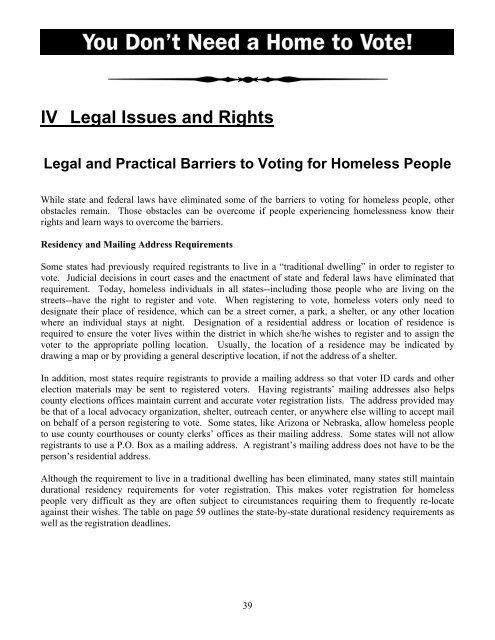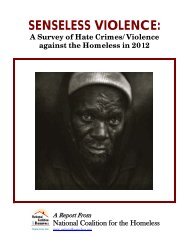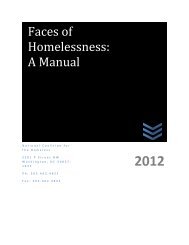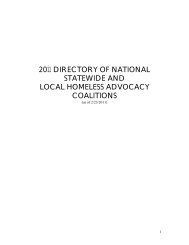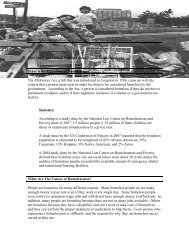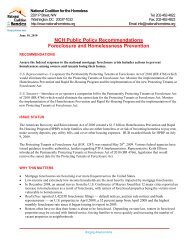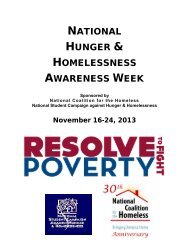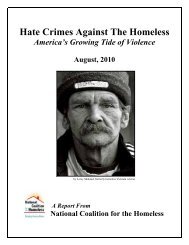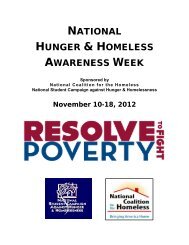The Strength to End Homelessness Lies In The Power of YOUR Vote!
The Strength to End Homelessness Lies In The Power of YOUR Vote!
The Strength to End Homelessness Lies In The Power of YOUR Vote!
You also want an ePaper? Increase the reach of your titles
YUMPU automatically turns print PDFs into web optimized ePapers that Google loves.
IV Legal Issues and Rights<br />
Legal and Practical Barriers <strong>to</strong> Voting for Homeless People<br />
While state and federal laws have eliminated some <strong>of</strong> the barriers <strong>to</strong> voting for homeless people, other<br />
obstacles remain. Those obstacles can be overcome if people experiencing homelessness know their<br />
rights and learn ways <strong>to</strong> overcome the barriers.<br />
Residency and Mailing Address Requirements<br />
Some states had previously required registrants <strong>to</strong> live in a “traditional dwelling” in order <strong>to</strong> register <strong>to</strong><br />
vote. Judicial decisions in court cases and the enactment <strong>of</strong> state and federal laws have eliminated that<br />
requirement. Today, homeless individuals in all states--including those people who are living on the<br />
streets--have the right <strong>to</strong> register and vote. When registering <strong>to</strong> vote, homeless voters only need <strong>to</strong><br />
designate their place <strong>of</strong> residence, which can be a street corner, a park, a shelter, or any other location<br />
where an individual stays at night. Designation <strong>of</strong> a residential address or location <strong>of</strong> residence is<br />
required <strong>to</strong> ensure the voter lives within the district in which she/he wishes <strong>to</strong> register and <strong>to</strong> assign the<br />
voter <strong>to</strong> the appropriate polling location. Usually, the location <strong>of</strong> a residence may be indicated by<br />
drawing a map or by providing a general descriptive location, if not the address <strong>of</strong> a shelter.<br />
<strong>In</strong> addition, most states require registrants <strong>to</strong> provide a mailing address so that voter ID cards and other<br />
election materials may be sent <strong>to</strong> registered voters. Having registrants’ mailing addresses also helps<br />
county elections <strong>of</strong>fices maintain current and accurate voter registration lists. <strong>The</strong> address provided may<br />
be that <strong>of</strong> a local advocacy organization, shelter, outreach center, or anywhere else willing <strong>to</strong> accept mail<br />
on behalf <strong>of</strong> a person registering <strong>to</strong> vote. Some states, like Arizona or Nebraska, allow homeless people<br />
<strong>to</strong> use county courthouses or county clerks’ <strong>of</strong>fices as their mailing address. Some states will not allow<br />
registrants <strong>to</strong> use a P.O. Box as a mailing address. A registrant’s mailing address does not have <strong>to</strong> be the<br />
person’s residential address.<br />
Although the requirement <strong>to</strong> live in a traditional dwelling has been eliminated, many states still maintain<br />
durational residency requirements for voter registration. This makes voter registration for homeless<br />
people very difficult as they are <strong>of</strong>ten subject <strong>to</strong> circumstances requiring them <strong>to</strong> frequently re-locate<br />
against their wishes. <strong>The</strong> table on page 59 outlines the state-by-state durational residency requirements as<br />
well as the registration deadlines.<br />
39


